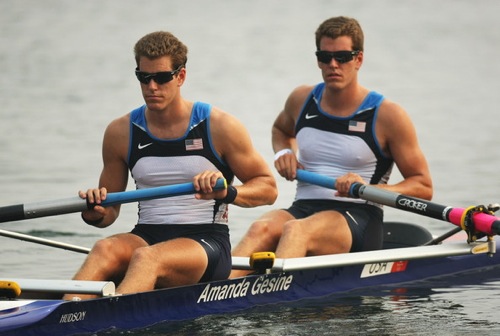
By Jeff Trexler
DC?s latest filing in the Siegel case made headlines because of the company?s request for a trial. But was that really a surprise? In today?s post, we?ll look at what the filing reveals about DC?s not-so-secret war ? and how the final fate of Superman may be determined by Facebook and the Winklevoss twins.As I explain in my recent podcast interviews with The Superman Homepage, the latest Time Warner brief isn?t a substantial change in legal strategy. Seeking a trial was central to DC?s cross-appeal to the Ninth Circuit from the outset.
The reason: the lower court district court key points were decided via summary judgment, a ruling without a trial. In filing its appeal last year, Time Warner took the position that summary judgment was inappropriate, inasmuch as material facts remain in dispute. DC?s appellate brief is the standard way all parties to an appeal explain their positions to the court, and it had long been scheduled to drop last Friday.
The brief and trial request may not have been a surprise, but they do help to highlight how DC has sought to reframe the case since Hollywood super-attorney Daniel Petrocelli replaced the company?s previous outside counsel. From the brief?s initial argument to its close, DC seeks to redefine the real conflict. This isn?t a mega-corporation versus two deserving heirs?rather, DC is targeting predatory businessmen who use the law as cover for victimizing their clients.
Here DC?s legal team rips a virtual page from the playbook used by Facebook in defending itself against the Winklevoss twins, who claimed that Mark Zuckerberg had stolen their online platform. In the Facebook case, the Winklevoss twins repudiated a summary agreement of terms before a long-form agreement was finalized. The Ninth Circuit, however, ruled that the summary term sheet was enforceable, thereby bringing this lengthy litigation to an end.
Directly citing the Ninth Circuit?s reasoning in the Facebook case, DC begins its brief by asking the court to enforce the settlement term sheet agreed upon by DC and the Siegels before Marc Toberoff and Hollywood agent Ari Emanuel persuaded the heirs to fire their original lawyer. If the one-page term sheet in the Facebook case was enforceable, DC argues, surely the six-page term sheet in the Siegel case was a sufficient expression of the agreed-upon material terms. Time Warner also echoes the language of the court?s ruling ? for example, TW?s assertion that ?This long-running dispute should be brought to an end? is a direct callback to the conclusion of the Ninth Circuit?s Facebook opinion: ?At some point, litigation must come to an end.?
Perhaps most important, though, is DC?s determination to present itself as the white hat in the case. The fact that Time Warner begins its federal appellate brief with a state-law argument for enforcing that term sheet is most deliberate ? TW wants to counter the sympathy for the Siegel family that was a more than evident factor in the 2008 decision that gave them half of Action Comics #1. It?s not the big bad corporation vs. the noble impoverished creator and his family ? to the contrary, the brief argues, Time Warner had set aside $20 million for Siegel?s widow and daughter, and the company anticipated paying more in keeping with a set of agreed-upon terms that Toberoff deceptively induced them to scuttle for his own personal gain.
Perhaps this argument would not be persuasive at a Comic-Con panel, but in court it?s legal dynamite. The Facebook case is a telling parallel ? the Ninth Circuit has already ruled in favor of a major corporation seeking to enforce the terms of a summary agreement with two individuals who rejected it in hopes of getting even more in court. As for a jury, DC is betting that most people, if offered tens of millions of dollars for something that their grandfather wrote almost eighty years ago, would be happy to take the deal. Giving this up to make a wealthy lawyer and a notorious Hollywood dealmaker even more rich will to the average juror seem more incomprehensible than inspiring.
If you continue to doubt the tactic?s potential effectiveness, consider how it changes the alternatives presented in the case. If Siegel?s surviving heir?Laura Siegel Larson?were to win, it would send the case back to the lower court for years of additional litigation as to value and other unresolved issues, with approximately half of that going to Toberoff and his company. If Laura Siegel Larson were to lose the case, she would likely gain a multimillion stake in Superman profits?and implicit in DC?s argument is the possibility that a related case would strip Toberoff?s share, leaving Larson with most of it herself. Like Facebook, DC is trying to argue that a victory for the corporation is efficient and fair?to rule otherwise would just give more money to opportunistic lawyers.
DC?s argument is equally revealing in regard to the perceived threat posed by Toberoff?s victory in the Siegel case. DC?s willingness to concede tens of millions to Siegel Larson shows just how much Time Warner and other IP holders want to take him down. The outlay is worth it if it strikes a fatal blow to the lawyer now perceived as the champion of creators and their heirs?sure, DC pays a few million now, but there?s a good chance that discrediting Toberoff could discourage others from fighting to reclaim their own comics copyright.
What does Toberoff?s appellate brief say about all this? I talk about that?as well as the future of Superman and the role of lawyers in shaping comics continuity?in the podcasts, and in my next post we?ll continue that conversation on The Beat.
walking dead season finale matt flynn denver news frozen planet creighton new smyrna beach st. joseph
No comments:
Post a Comment
Note: Only a member of this blog may post a comment.